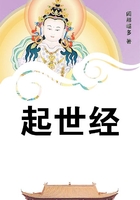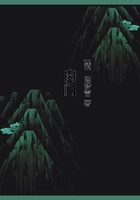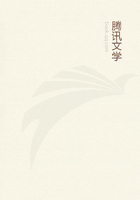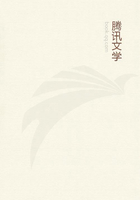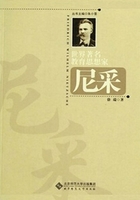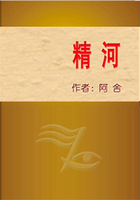"The god Bêl hates me--I cannot dwell in this land, and in the territory of Bêl I cannot set my face.I shall descend then to the Abyss; with Aa my lord shall I constantly dwell." It is with these words that, by the counsel of the god Aa, Ut-napi?tim explained to those who questioned him the reason why he was building the ship or ark which was to save him and his from the Flood, and there is but little doubt that the author of the story implied that he announced thereby his approaching death, or his departure to dwell with his god without passing the dread portals of the great leveller.This belief in the life beyond the grave seems to have been that which was current during the final centuries of the third millennium before Christ--when a man died, it was said that his god took him to himself, and we may therefore suppose, that there were as many heavens--places of contentment and bliss--as there were gods, and that every good man was regarded as going and dwelling evermore with the deity which he had worshipped and served faithfully during his lifetime.
Gilgame?, the half-divine king of Erech, who reigned during the half-mythical period, on losing his friend and counsellor, Enki-du, set out to find him, and to bring him back, if possible, from the underworld where he was supposed to dwell.His death, however, had not been like that of an ordinary man; it was not Namtaru, the spirit of fate, who had taken him, nor a misfortune such as befalls ordinary men, but Nerigal's unsparing lier-in-wait--yet though Nerigal was the god of war, Enki-du had not fallen on the battlefield of men, but had been seized by the earth (apparently the underworld where the wicked are is meant) in consequence, seemingly, of some trick or trap which had been laid for him.
The gods were therefore prayed, in turn, to bring him back, but none of them listened except êa, who begged him of Nerigal, whereupon the latter opened the entrance to the place where he was--the hole of the earth--and brought forth "the spirit (/utukku/) of Enki-du like mist."Immediately after this come the words, "Tell, my friend, tell, my friend--the law of the land which thou sawest, tell," and the answer, "I will not tell thee, friend, I will not tell thee--if I tell thee the law of the land which I saw,...sit down, weep." Ultimately, however, the person appealed to--apparently the disembodied Enki-du--reveals something concerning the condition of the souls in the place of his sojourn after death, as follows:--"Whom thou sawest [die] the death(?) [of][*]...[I see]--In the resting-place of...reposing, pure waters he drinketh.
Whom in the battle thou sawest killed, I see--His father and his mother raise his head, And his wife upon [him leaneth?].
Whose corpse thou hast seen thrown down in the plain, I see--His /edimmu/ in the earth reposeth not.
Whose /edimmu/ thou sawest without a caretaker, I see--The leavings of the dish, the remains of the food, Which in the street is thrown, he eateth."[*] (?)"The death of the righteous," or something similar?
It is naturally difficult to decide in a passage like this, the difference existing between a man's /utukku/ and his /edimmu/, but the probability is, that the former means his spiritual essence, whilst the latter stands for the ghostly shadow of his body, resembling in meaning the /ka/ of the Egyptians.To all appearance the abode described above is not the place of the punishment of the wicked, but the dwelling of those accounted good, who, if lucky in the manner of their death, and the disposal of their bodies, enjoyed the highest happiness in the habitation of the blest.The other place, however, is otherwise described (it occurs in the account of I?tar's descent into Hades, and in the seventh tablet of the Gilgame? series--the latter differing somewhat):--"Upon the land of No-return, the region of..., [Set] Istar, daughter of Sin, her ear.
The daughter of Sin set then her ear...
Upon the house of gloom, the seat of Irkalla--Upon the house whose entrance hath no exit,Upon the path whose way hath no return, Upon the house whose enterers are deprived of light, Where dust is their nourishment, their food mud, Light they see not, in darkness they dwell, Clothed also, like a bird, in a dress of feathers.
Upon the door and bolt the dust hath blown."One of the names of Nergal.
Or "whose enterer goeth not forth."
Seven gates gave access to this place of gloom, and the porter, as he let the visitor in, took from her (the goddess I?tar in the narrative)at each an article of clothing, until, at the last, she entered quite naked, apparently typifying the fact that a man can take nothing with him when he dieth, and also, in this case, that he has not even his good deeds wherewith to clothe himself, for had they outweighed his evil ones, he would not have found himself in that dread abode.
On the arrival of I?tar in Hades, Erê?-ki-gal commanded Namtaru, the god of fate, to smite I?tar with disease in all her members--eyes, sides, feet, heart, and head.As things went wrong on the earth in consequence of the absence of the goddess of love, the gods sent a messenger to effect her release.When he reached the land of No-return, the queen of the region threatened him with all kinds of torments--the food of the gutters of the city were to be his food, the oil-jars of the city (naptha?) his drink, the gloom of the castle his resting-place, a stone slab his seat, and hunger and thirst were to shatter his strength.These were evidently the punishments inflicted there, but as the messenger threatened was a divine one, they were probably not put into execution, and he obtained his demand, for I?tar was set free, receiving back at each gate, in reverse order, the clothing and ornaments which had been taken from her when she had descended thither.It is uncertain whether Tammuz, for whom she had gone down, was set free also, but as he is referred to, it is not improbable that this was the case.
End

